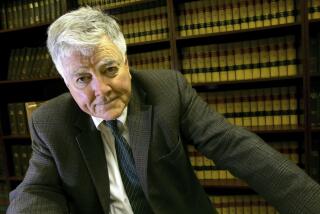Ed Muskie and the Second Political Resurrection of Richard Nixon : Politics: A behind-the-scenes minuet whereby two old enemies united to keep the Cold War from heating up.
- Share via
In the crevices of a great career, one sometimes discovers true character. So it was with Edmund Muskie. His many public roles garnered esteem, but perhaps the most revealing confirmation of his quality as a statesman lies in an unknown facet of his public service: Ed Muskie was a central figure in the political resurrection of Richard Nixon.
The story will surprise most people who knew the two men, but it offers an extraordinary demonstration of how concern for the nation’s interest can bridge the most intense partisan differences. The tale is a tribute to both men, exemplifying a civility and capacity to cooperate that is rare among veterans of political combat.
In the early months of the Reagan administration, many observers in both parties worried that U.S. policy was tilting too sharply into a rigid nonnegotiable posture toward the Soviet Union. President Reagan’s rhetoric and the policy impulses of some of his appointees were so fiercely anti-Soviet that it appeared doubtful any useful business could be done with Moscow. In particular, the negotiated restraints on nuclear arms, so laboriously crafted in the Nixon, Ford and Carter administrations, were in jeopardy.
By 1983, worry about the downward spiral in superpower relations had crossed the line to alarm. Some questioned whether it was possible to find common ground between Republicans and Democrats on the divisive issue of U.S.-Soviet relations. And even if there were the basis for a bipartisan approach, how could it be framed to enlist President Reagan’s personal interest--especially if he received counsel against the grain of his deep-seated convictions about the “evil empire”? Mutterings in various Washington settings ran frequently to the theme that, if anybody could tender sensible advice that Reagan would consider, it was Richard Nixon.
But Nixon was still damaged goods, an outcast viewed warily by the Reagan circle. To consult him was not a natural impulse, particularly when some officials considered him either too soft on the Soviets or too likely to overwhelm their own preferred positions on dealing with the Soviets. How, then, could Nixon’s strategic insight and diplomatic experience be brought into play?
Pondering the question in discussions with us, Ed Muskie recognized the possibility of doing so by engaging his former political adversary in a confidential initiative to offer President Reagan independent views from outside the normal bureaucratic channels. For Reagan to take counsel from Nixon in partnership with a former Democratic secretary of state and presidential contender would be a very different matter from listening to Nixon as a solo advisor. The concept was intriguing and Nixon proved more than curious and willing to talk.
As a first step in the delicate exercise, Muskie met with Nixon at the New York apartment of his daughter Tricia Nixon Cox. When the two old warriors sized each other up, what was most striking was the total lack of rancor. Whatever the residue from the bitter campaign battles they had fought, not least the dirty tricks perpetrated against Muskie by Nixon’s lackeys in 1972, the two men moved immediately to focus on their shared concerns about the impasse in Soviet-American diplomacy.
Out of that initial conversation grew a sequence of consultations that opened a channel for quiet advice to President Reagan as he moved through the 1984 election and into a more forthcoming period of negotiations with the Soviets in his second term.
The consultations were fascinating. All participants, including the authors, required confidentiality, especially Muskie, for whom the risks in the collaboration were greatest. It could have been exceedingly harmful to the Democratic candidate (Walter Mondale) if the incumbent defended himself against foreign policy challenges by announcing that he was receiving advice from the previous Democratic secretary of state. To their credit, Reagan and James Baker, then White House chief of staff and the inside contact for the project, respected that requirement and did not exploit the effort for political advantage. (The venture did become public in January 1985, when Life magazine published a photograph of a meeting among Reagan, Muskie, Nixon and Howard Baker.) For his part, Muskie informed only Mondale and did not discuss the substance of the private exchanges with Reagan.
In preparing ideas for Reagan, the three outsiders (Muskie, Nixon and Howard Baker) circulated a good many papers, although the group did not meet often. But they found their ideas broadly compatible and their encounters memorable. Muskie and others involved met a different Nixon from the one who had resigned his office. He retained the extraordinary strategic grasp and the workaholic habits for which he was known, yet he now conveyed a good humor and cheerful detachment that made it easy to be with him. The coiled-spring quality and strained efforts at hearty camaraderie that marked Nixon at the height of his ambition had yielded to a warmer, more natural personality, albeit one still tinged with formality.
At his New Jersey home or in a restaurant, Nixon was an exceedingly gracious host, open-minded in discussion and more comfortable to be around than one would have imagined. An ultimate gesture of personal thoughtfulness came one evening at Nixon’s home, when he broke out a wine bottled in 1914, the year Muskie was born. Perhaps to their own surprise, the men enjoyed each other’s company and were reinforced in their sense that they could work together. The cautious first approach from Muskie to Nixon gave way not to a bond of friendship, but to a genuine mutual regard.
The effort culminated in a luncheon session with Reagan at the Waldorf Astoria on Sept. 27, 1984, following Reagan’s address to the United Nations. What did they tell the president? One point of emphasis concerned the exorbitant verification standards being pressed by some arms control critics in the administration. Nixon’s message was that adequate verification was feasible, and he argued that Reagan should not allow that issue to be the linchpin of the entire negotiation. Muskie underscored the building blocks that prior strategic arms agreements (SALT I and SALT II) could provide for the major strategic reductions to which Reagan was already committed. Given Reagan’s advocacy of “Star Wars,” Muskie steered clear of arguments about strategic defense, realizing that he was more skeptical of its promise and more worried about its destabilizing potential than the other participants. The conversation ran not to details of nuclear theology but to the statecraft needed to reverse the dangerous turn that had developed in the languishing relationship with the Soviet Union.
Whether that discussion and the group’s other communications had a major impact on Reagan’s subsequent movement toward strategic arms negotiations, no one can say. But the tenor of their counsel certainly ran in that direction. Perhaps most important, largely due to Muskie’s involvement, this series of efforts went far toward legitimizing Nixon’s emergence as a senior statesman.
The Muskie-Nixon collaboration was the prelude to Nixon’s continuing service in his latter years, including the meetings with Mikhail Gorbachev and Boris Yeltsin on which he drew for reports to Presidents Reagan and Bush. By 1988, a private meeting with Nixon, flown to the White House for that purpose, did more than anything to engage Reagan in the business of that year’s Moscow summit. As Nixon spoke at length about the critical questions coming up, Reagan appeared mesmerized. (That visit, by the way, gave Nixon his first glimpse of his wife’s portrait hanging in the White House.) Out of his fallen predecessor’s return to service also came what President Clinton has called the best brief advice on foreign policy he ever received, a compliment to Nixon that Clinton says his own advisors did not entirely applaud.
So there you have another vignette of Ed Muskie’s contributions to the republic. Not his greatest achievement, but a notable measure of his magnanimity as a man and his pragmatism as a political leader. Knowing that his views would carry little weight if voiced by him alone, he enlisted the perfect ally in a cause they both considered vital. No statesman could have done it better--indeed, it may be that no one else could have done it at all.
More to Read
Get the L.A. Times Politics newsletter
Deeply reported insights into legislation, politics and policy from Sacramento, Washington and beyond. In your inbox twice per week.
You may occasionally receive promotional content from the Los Angeles Times.










